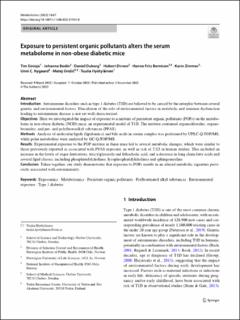| dc.contributor.author | Sinioja, Tim | |
| dc.contributor.author | Bodin, Johanna Eva | |
| dc.contributor.author | Duberg, Daniel | |
| dc.contributor.author | Dirven, Hubert | |
| dc.contributor.author | Berntsen, Hanne Friis | |
| dc.contributor.author | Zimmer, Karin Elisabeth | |
| dc.contributor.author | Nygaard, Unni Cecilie | |
| dc.contributor.author | Orešič, Matej | |
| dc.contributor.author | Hyötyläinen, Tuulia | |
| dc.date.accessioned | 2023-01-06T13:05:30Z | |
| dc.date.available | 2023-01-06T13:05:30Z | |
| dc.date.created | 2022-11-09T12:40:38Z | |
| dc.date.issued | 2022 | |
| dc.identifier.citation | Journal of Cheminformatics. 2022, 18 (11), . | |
| dc.identifier.issn | 1758-2946 | |
| dc.identifier.uri | https://hdl.handle.net/11250/3041610 | |
| dc.description.abstract | Introduction Autoimmune disorders such as type 1 diabetes (T1D) are believed to be caused by the interplay between several genetic and environmental factors. Elucidation of the role of environmental factors in metabolic and immune dysfunction leading to autoimmune disease is not yet well characterized. Objectives Here we investigated the impact of exposure to a mixture of persistent organic pollutants (POPs) on the metabolome in non-obese diabetic (NOD) mice, an experimental model of T1D. The mixture contained organochlorides, organobromides, and per- and polyfuoroalkyl substances (PFAS). Methods Analysis of molecular lipids (lipidomics) and bile acids in serum samples was performed by UPLC-Q-TOF/MS, while polar metabolites were analyzed by GC-Q-TOF/MS. Results Experimental exposure to the POP mixture in these mice led to several metabolic changes, which were similar to those previously reported as associated with PFAS exposure, as well as risk of T1D in human studies. This included an increase in the levels of sugar derivatives, triacylglycerols and lithocholic acid, and a decrease in long chain fatty acids and several lipid classes, including phosphatidylcholines, lysophosphatidylcholines and sphingomyelins. Conclusion Taken together, our study demonstrates that exposure to POPs results in an altered metabolic signature previously associated with autoimmunity | |
| dc.language.iso | eng | |
| dc.title | Exposure to persistent organic pollutants alters the serum metabolome in non-obese diabetic mice | |
| dc.title.alternative | Exposure to persistent organic pollutants alters the serum metabolome in non-obese diabetic mice | |
| dc.type | Peer reviewed | |
| dc.type | Journal article | |
| dc.description.version | publishedVersion | |
| dc.source.pagenumber | 14 | |
| dc.source.volume | 18 | |
| dc.source.journal | Journal of Cheminformatics | |
| dc.source.issue | 11 | |
| dc.identifier.doi | 10.1007/s11306-022-01945-0 | |
| dc.identifier.cristin | 2071196 | |
| dc.relation.project | Vetenskapsrådet: 2020-03674 | |
| dc.relation.project | Vetenskapsrådet: 2016-05176 | |
| dc.relation.project | Norges forskningsråd: 213060 | |
| cristin.ispublished | true | |
| cristin.fulltext | original | |
| cristin.qualitycode | 1 | |
